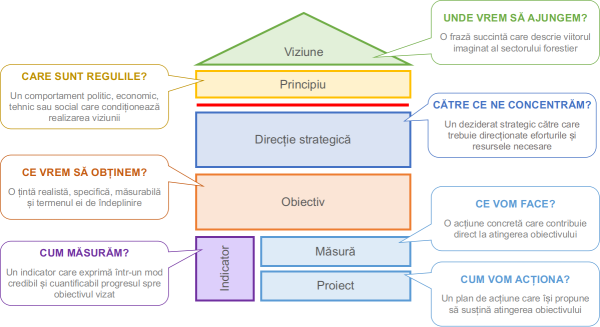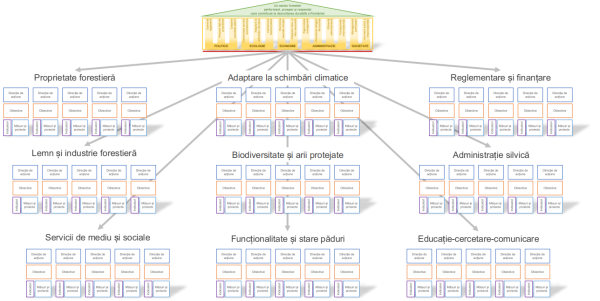 Opțiuni strategice pentru dezvoltarea politicii forestiere
Opțiuni strategice pentru dezvoltarea politicii forestiere
Strategic options for forest policy development
User Tools
Sidebar
Methodology
The methodology that was suggested for the consultation process of the stakeholders is adapted to the attributes listed above. Moreover, the process is adjusted to the pandemic context, which is why it is based primarily on utilising online tools.
The stakeholders could resgister institutionally or voluntarily, as specialists or as representatives of the civil society, being able to join one or more of the focus groups/topics defined through the preliminary consulting process.
The consultating process relies on a transition from a general approach (vision and principles) to a more specific one (objectives and measures), based on a summary of the process of identification and wording of the strategic options that was mainly accepted.
This was based on the hypothesis that when it comes to guiding principles and general lines of action (as they are defined below) the chances of reaching a consensus are higher, while the more detailed the specific objects and essential measures are, the bigger the differences between the stakeholders’ opinions. The methodology ensures the framework through which the stakeholders are consulted, one by one, about the guiding principles, strategic lines of action, the objectives and essential measures.
Stage I: Establishing the working groups and completing the methodology
This stage involves the registration of the stakeholders on focus groups and topics. Each group will have two rapporteurs (one from each university) and a secretariat (with the support of the central public authority) assigned. Inside the group, the dialogue will be managed objectively by the rapporteurs and the secretariat will ensure the transparency of the process for its whole duration. The documents that result from the activity of each group will be merged and the overlaps eliminated to create a final, integrated document that represents the main goal of this process. The latter will be conducted by a team formed of 8-10 members designated by the two universities (including the rapporteurs). This document will be subject to public debate.
In this stage, the methodology for consulting the stakeholders will be elaborated and all the participants will be informed in detail about it.
Stage II: Consulting the main stakeholders about the guiding principles and the strategic lines of action
This phase is meant to find a way to obtain a consensus between the stakeholders regarding the main framework for formulating the strategic options and the lines of action. This stage includes:
- The participants will be asked to fill in forms about the guiding principles and the strategic lines of action, with variants that are already included in programmatic documents suggested for this sector (globally, at European level and/or from other countries with similar conditions to Romania), while keeping the option of formulating different principles or lines of action open. The secretariat will help centralise the forms.
- Holding a meeting with the members of the groups in order to reach, based on the mediation of the rapporteurs, a consensus between the participants regarding the lines of action that are considered of utmost necessity.
- Based on the discussions occuring during the meetings for each group, inside the 8-10 member working team designated by the two universities (rapporteurs included), a new document will be issued, comprising the guiding principles and the lines of action, which will be made available to all the participants.
Stage III : Consulting the stakeholders about specific objectives and necessary measures
This stage involves identifying participants’ options on the specific objectives and necessary measures for each strategic line of action that came as a result of the completion of stage I. This includes the following:
- The participants will be asked to fill in forms designed for each focus group, that will enable them to mention, for each specific objective: necessary measures, partners for implementation, proposed projects, strategic contribution, monitoring indexes, risks, costs, benefits etc. The secretariat will help centralise the forms
- Analysing the forms and structuring the answers (options) for a future debate during a meeting.
- Holding meetings with the groups in order to present and discuss the options regarding specific objectives and measures described by the participants in the forms.
- Based on the discussions, the integration team will create a new stage document, with the objectives and measures indicated by the options of the participants.
Stage IV: Elaborating a summary document and publicly debating it
This stage is conducted by the integration team and implies centralising and presenting the strategic options of the participants about the guiding principles, the lines of action, the objectives and measures. A sketch of the document will be further discussed with the participants, and any commentary or suggestion will be received and included in the final document that will be submitted to the competent central public authority.
The results of the public consulting process, per each topic, will be subject to a public debate where all stakeholders will be invited.


